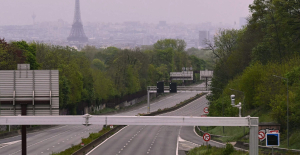These are two pipelines that have been the subject of geopolitical standoffs in recent months. The Nord Stream gas pipelines linking Russia to Germany were both suddenly hit by unexplained leaks in the Baltic Sea, Danish and Swedish authorities announced on Tuesday, September 27, raising suspicions of sabotage. The two pipelines operated by a consortium dependent on the Russian giant Gazprom are not operational due to the consequences of the war in Ukraine. But both were still full of gas.
On Monday, the German authorities indicated that they had been informed of a "sharp drop in pressure on the Nord Stream 2 pipeline", as indicated by the Ministry of the Economy. The day after the announcement of this leak in the Nord Stream 2 gas pipeline, the Nord Stream 1 gas pipeline linking Russia to Germany was in turn affected by two very rare gas leaks in the Baltic Sea, the authorities indicated on Tuesday. authorities of the two Nordic countries.
These three leaks are located off the Danish island of Bornholm. The leaks on Nord Stream 1 take place outside territorial waters but one is in the exclusive economic zone of Denmark, the other in that of Sweden.
Built in parallel to the Nord Stream 1 gas pipeline, the Nord Stream 2 pipeline was intended to double the capacity for importing Russian gas into Germany. But its impending commissioning has been suspended, in retaliation for Moscow's invasion of Ukraine. Gazprom gradually reduced volumes of gas delivered through Nord Stream 1 until the pipeline was completely shut down at the end of August, blaming Western sanctions for delaying needed repairs to the pipeline.
Copenhagen immediately placed its energy infrastructure on alert, while considering that it was "too early" to comment on the causes of these simultaneous incidents. The alert level was raised to orange, the second highest.
"Gas pipeline leaks are extremely rare and we therefore see a reason to increase the level of vigilance following the incidents we have witnessed in the last 24 hours," said the director of the Danish agency in a press release. energy, Kristoffer Böttzauw.
Concrete measures to increase the safety of factories and installations will therefore have to be put in place by companies in the sector, particularly with regard to access, surveillance and the proper maintenance of installations.
Navigation was prohibited within a radius of five nautical miles (about nine kilometers) around the three leaks, as well as their overflight within a radius of one kilometer. According to the authorities, the incidents have no consequences for the safety or health of residents of the neighboring Danish islands of Bornholm and Christiansø. The environmental impact should be local and limited, according to initial assessments.
This Tuesday, the Danish Prime Minister inaugurated with her Norwegian and Polish colleagues the Baltic Pipe, a gas pipeline linking Poland to Norway and passing through the territory and waters of the Scandinavian country.
The Kremlin said on Tuesday "extremely concerned" by these leaks. "We are extremely concerned about this news," Kremlin spokesman Dmitry Peskov told reporters, calling the available information "very alarming." "Indeed, the pressure has dropped significantly" in the gas pipelines, he added. Asked about the possibility of an act of sabotage, he replied: "No option can be ruled out".
"It is obvious that there is some kind of breakdown (...), but it is impossible to exclude anything before the results are available", continued Dmitry Peskov, stressing that the functioning of Nord Stream 1 was a matter of "energy security of the entire (European) continent".
For its part, Denmark, through the voice of its Prime Minister Mette Frederiksen, estimated this Tuesday before the Danish media that it is "difficult to imagine" that the three concomitant leaks on the two gas pipelines in the Baltic Sea are "accidental “, saying not to “exclude” sabotage.
German authorities did not immediately comment on the incident. But according to a source close to the German government, quoted by the German daily Taggesspiegel, "everything speaks against a coincidence". "We cannot imagine a scenario that is not a targeted attack," said this source.
The pipeline operator, the Nord Stream consortium, said it could not see or assess the damage, but acknowledged the exceptional nature of the situation. "An incident in which three pipes simultaneously experience difficulties on the same day is not ordinary," a spokesman told AFP. Military officials regularly warn of the risk of sabotaging essential civilian underwater installations, such as telecommunications cables, electrical or hydrocarbon connections.

 New York: at Columbia University, the anti-Semitic drift of pro-Palestinian demonstrations
New York: at Columbia University, the anti-Semitic drift of pro-Palestinian demonstrations What is Akila, the mission in which the Charles de Gaulle is participating under NATO command?
What is Akila, the mission in which the Charles de Gaulle is participating under NATO command? Lawyer, banker, teacher: who are the 12 members of the jury in Donald Trump's trial?
Lawyer, banker, teacher: who are the 12 members of the jury in Donald Trump's trial? After 13 years of mission and seven successive leaders, the UN at an impasse in Libya
After 13 years of mission and seven successive leaders, the UN at an impasse in Libya What High Blood Pressure Does to Your Body (And Why It Should Be Treated)
What High Blood Pressure Does to Your Body (And Why It Should Be Treated) Vaccination in France has progressed in 2023, rejoices Public Health France
Vaccination in France has progressed in 2023, rejoices Public Health France Food additives suspected of promoting cardiovascular diseases
Food additives suspected of promoting cardiovascular diseases “Even morphine doesn’t work”: Léane, 17, victim of the adverse effects of an antibiotic
“Even morphine doesn’t work”: Léane, 17, victim of the adverse effects of an antibiotic Unemployment insurance: tightening of the rules on July 1
Unemployment insurance: tightening of the rules on July 1 Cancers, chronic diseases... Billions of workers hit by climate change, warns the UN
Cancers, chronic diseases... Billions of workers hit by climate change, warns the UN Closure of the A13 extended until at least mid-week
Closure of the A13 extended until at least mid-week Closure of the A13: Pécresse “asks the State to take charge of making the A14 free”
Closure of the A13: Pécresse “asks the State to take charge of making the A14 free” The series adaptation of One Hundred Years of Solitude promises to be faithful to the novel by Gabriel Garcia Marquez
The series adaptation of One Hundred Years of Solitude promises to be faithful to the novel by Gabriel Garcia Marquez Racism in France: comedian Ahmed Sylla apologizes for “having minimized this problem”
Racism in France: comedian Ahmed Sylla apologizes for “having minimized this problem” Mohammad Rasoulof and Michel Hazanavicius in competition at the Cannes Film Festival
Mohammad Rasoulof and Michel Hazanavicius in competition at the Cannes Film Festival UK lends Ghana treasures stolen during colonization
UK lends Ghana treasures stolen during colonization Skoda Kodiaq 2024: a 'beast' plug-in hybrid SUV
Skoda Kodiaq 2024: a 'beast' plug-in hybrid SUV Tesla launches a new Model Y with 600 km of autonomy at a "more accessible price"
Tesla launches a new Model Y with 600 km of autonomy at a "more accessible price" The 10 best-selling cars in March 2024 in Spain: sales fall due to Easter
The 10 best-selling cars in March 2024 in Spain: sales fall due to Easter A private jet company buys more than 100 flying cars
A private jet company buys more than 100 flying cars This is how housing prices have changed in Spain in the last decade
This is how housing prices have changed in Spain in the last decade The home mortgage firm drops 10% in January and interest soars to 3.46%
The home mortgage firm drops 10% in January and interest soars to 3.46% The jewel of the Rocío de Nagüeles urbanization: a dream villa in Marbella
The jewel of the Rocío de Nagüeles urbanization: a dream villa in Marbella Rental prices grow by 7.3% in February: where does it go up and where does it go down?
Rental prices grow by 7.3% in February: where does it go up and where does it go down? Europeans: “All those who claim that we don’t need Europe are liars”, criticizes Bayrou
Europeans: “All those who claim that we don’t need Europe are liars”, criticizes Bayrou With the promise of a “real burst of authority”, Gabriel Attal provokes the ire of the opposition
With the promise of a “real burst of authority”, Gabriel Attal provokes the ire of the opposition Europeans: the schedule of debates to follow between now and June 9
Europeans: the schedule of debates to follow between now and June 9 Europeans: “In France, there is a left and there is a right,” assures Bellamy
Europeans: “In France, there is a left and there is a right,” assures Bellamy These French cities that will boycott the World Cup in Qatar
These French cities that will boycott the World Cup in Qatar Basketball (F): big winner of Asvel, Basket Landes will face Tarbes in the semi-final of the League
Basketball (F): big winner of Asvel, Basket Landes will face Tarbes in the semi-final of the League Football: Yazici (Lille) “in shock” after an attempted theft at his home
Football: Yazici (Lille) “in shock” after an attempted theft at his home Serie A: victorious over AC Milan, Inter crowned Italian champions for the 20th time
Serie A: victorious over AC Milan, Inter crowned Italian champions for the 20th time Serie A: “Winning a title in a derby has never happened,” relishes Martinez after Inter’s coronation
Serie A: “Winning a title in a derby has never happened,” relishes Martinez after Inter’s coronation


















